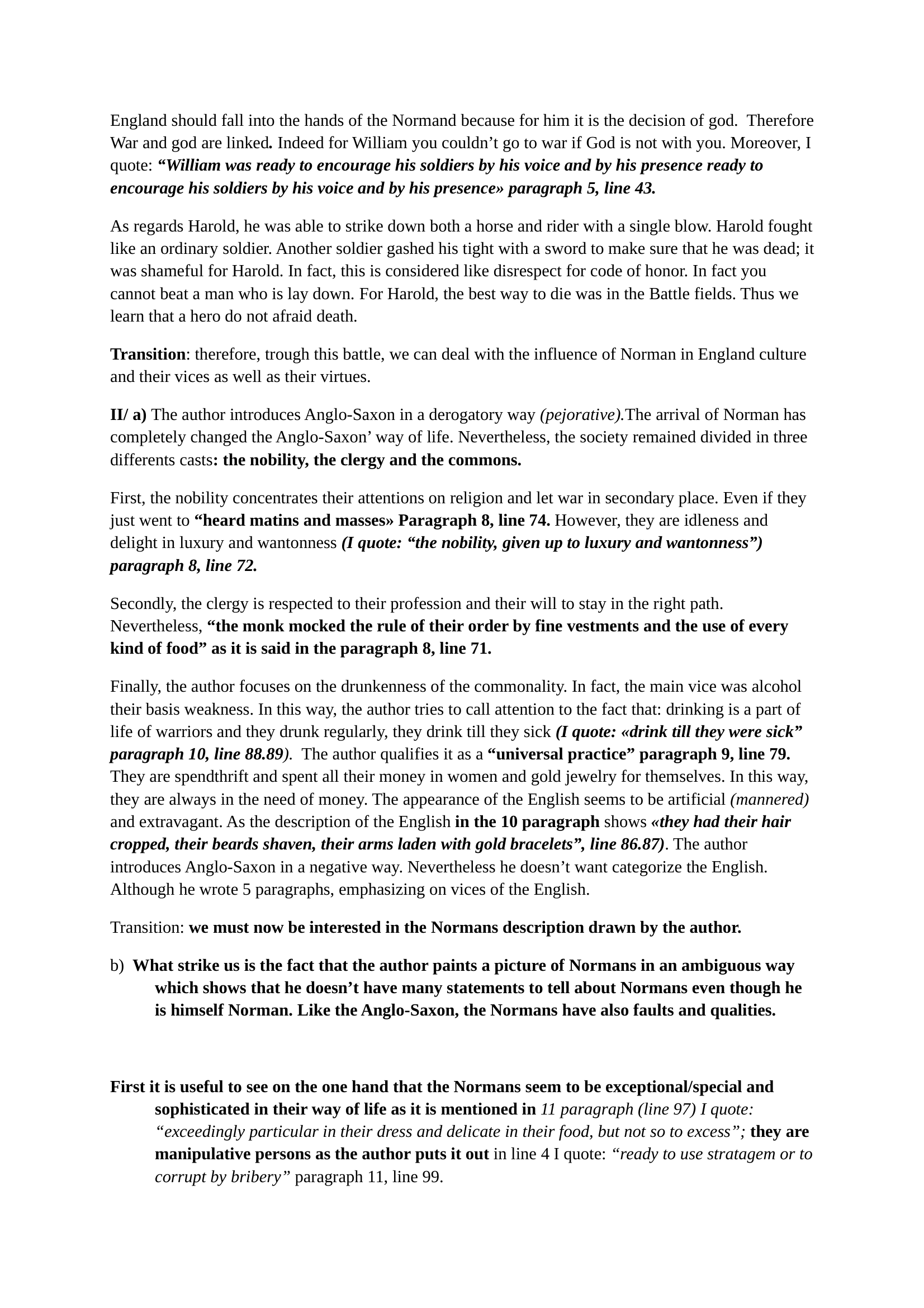battle of hasting
Publié le 02/12/2012

Extrait du document
«
England should fall into the hands of the Normand because for him it is the decision of god.
Therefore
War and god are linked .
Indeed for William you couldn’t go to war if God is not with you.
Moreover, I
quote: “William was ready to encourage his soldiers by his voice and by his presence ready to
encourage his soldiers by his voice and by his presence» paragraph 5, line 43.
As regards Harold, he was able to strike down both a horse and rider with a single blow.
Harold fought
like an ordinary soldier.
Another soldier gashed his tight with a sword to make sure that he was dead; it
was shameful for Harold.
In fact, this is considered like disrespect for code of honor.
In fact you
cannot beat a man who is lay down .
For Harold, the best way to die was in the Battle fields.
Thus we
learn that a hero do not afraid death.
Transition : therefore, trough this battle, we can deal with the influence of Norman in England culture
and their vices as well as their virtues.
II/ a) The author introduces Anglo-Saxon in a derogatory way (pejorative).
The arrival of Norman has
completely changed the Anglo-Saxon’ way of life.
Nevertheless, the society remained divided in three
differents casts : the nobility, the clergy and the commons.
First, the nobility concentrates their attentions on religion and let war in secondary place.
Even if they
just went to “heard matins and masses» Paragraph 8, line 74.
However, they are idleness and
delight in luxury and wantonness (I quote: “the nobility, given up to luxury and wantonness”)
paragraph 8, line 72.
Secondly, the clergy is respected to their profession and their will to stay in the right path.
Nevertheless, “the monk mocked the rule of their order by fine vestments and the use of every
kind of food” as it is said in the paragraph 8, line 71.
Finally, the author focuses on the drunkenness of the commonality.
In fact, the main vice was alcohol
their basis weakness.
In this way, the author tries to call attention to the fact that: drinking is a part of
life of warriors and they drunk regularly, they drink till they sick (I quote: «drink till they were sick”
paragraph 10, line 88.89 ).
The author qualifies it as a “universal practice” paragraph 9, line 79.
They are spendthrift and spent all their money in women and gold jewelry for themselves.
In this way,
they are always in the need of money.
The appearance of the English seems to be artificial (mannered)
and extravagant.
As the description of the English in the 10 paragraph shows «they had their hair
cropped, their beards shaven, their arms laden with gold bracelets”, line 86.87) .
The author
introduces Anglo-Saxon in a negative way.
Nevertheless he doesn’t want categorize the English.
Although he wrote 5 paragraphs, emphasizing on vices of the English.
Transition: we must now be interested in the Normans description drawn by the author.
b) What strike us is the fact that the author paints a picture of Normans in an ambiguous way
which shows that he doesn’t have many statements to tell about Normans even though he
is himself Norman.
Like the Anglo-Saxon, the Normans have also faults and qualities.
First it is useful to see on the one hand that the Normans seem to be exceptional/special and
sophisticated in their way of life as it is mentioned in 11 paragraph (line 97) I quote:
“exceedingly particular in their dress and delicate in their food, but not so to excess”; they are
manipulative persons as the author puts it out in line 4 I quote: “ready to use stratagem or to
corrupt by bribery” paragraph 11, line 99..
»
↓↓↓ APERÇU DU DOCUMENT ↓↓↓
Liens utiles
- BATAILLE DES LIVRES (La) [The Battle of the Books] (résumé & analyse) de Jonathan Swift
- Battle, Kathleen - musique.
- The Tennis Battle of the Sexes.
- Myrmidons Greek Warlike people of ancient Thessaly, in the eastern part of the Greek mainland, who accompanied the hero Achilles into battle in the Trojan War.
- Palla s (Warrior) Greek A second generation Titan; considered by some to be the god of warfare and of the springtime battle season.

































